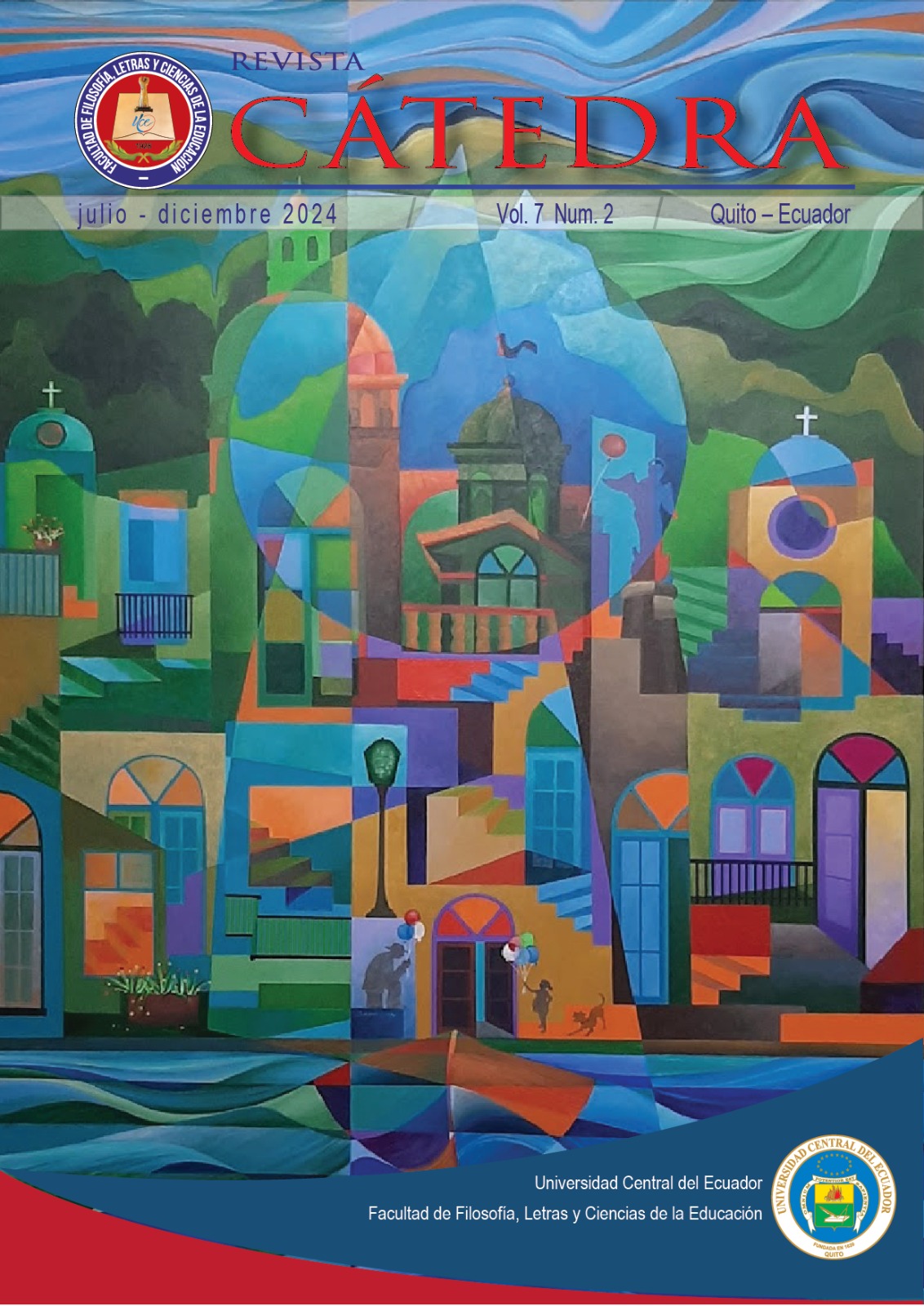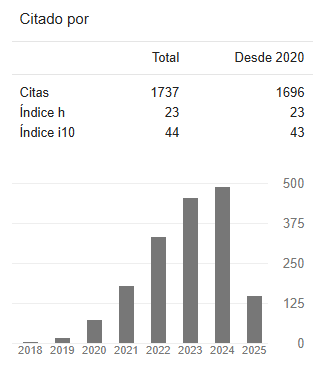Measurement of the appropriation of learning achievements in physics in virtual and blended modalities
DOI:
https://doi.org/10.29166/catedra.v7i2.5216Keywords:
online learning, physics teaching, educational strategies, learning achievement, educational purposes, school performanceAbstract
The aim of this study was to evaluate the impact of the covid-19 pandemic on the acquisition of learning achievements in Physics in students of the Lev Vygotsky Educational Unit in the city of Quito-Ecuador through the statistical analysis of standardized assessments. An evaluation matrix was designed to record the learning achievement to be evaluated, together with the corresponding code for its identification, level and type of achievement. The instrument consisted of 20 multiple-choice questions with four options, covering elementary, basic and advanced levels. The questions were grouped by topic and structured to demonstrate the applicability of knowledge. Assessments were cumulative and included all content covered during the first quarter of the 2021-2022 school year. Data were collected through assessments validated by the institution's mediators and analysed to identify significant differences between virtual and blended learning modes. The results of mean comparison by means of the t-test indicated that there is no significant difference in the appropriation of learning achievements between students who attended blended and virtual classes. This study highlights the importance of effective pedagogical practices in the appropriation of students' learning achievements regardless of the mode of study.
Downloads
References
Brito Albuja, J. (2013). Modelo pedagógico formativo (1st ed., Vol. 1, pp. 7–51). Líderes Ediciones.
Brito, J. (2019). Resultados del aprehendizaje [Personal communication].
Castro, J. (2017, October 20). La matemática como la base lógica de pedagogía conceptual. II Congreso Internacional de Etnomatemática y II Simposio Internacional de Etnociencias.
CEDEFOP. (2011). Al definir los resultados del aprendizaje en los currícula, todos los alumnos cuentan. Nota Informativa, 9060 ES, 1–4. Centro Europeo para el Desarrollo de la Formación Profesional. https://www.cedefop.europa.eu/files/9060_es.pdf
Crawford, J. (2020). COVID-19: 20 countries’ higher education intra-period digital pedagogy responses. Journal of Applied Learning & Teaching, 3(1), 1–20. https://doi.org/10.37074/jalt.2020.3.1.7 DOI: https://doi.org/10.37074/jalt.2020.3.1.7
De Zubiría, J. (2015). Los modelos pedagógicos. Magisterio Editorial. (Original work published 2002)
De Zubiría, M. (2000). Pedagogías del siglo XXI: Mentefactos I: El arte de pensar para enseñar y de enseñar para pensar. Fundación Alberto Merani.
De Zubiría, M., Vinueza, T., Portero, R., Coral, L., Rosas, J., y Giraldo, J. (2019). Pedagogía conceptual: una puerta al futuro de la educación. Ediciones de la U.
George-Reyes, C. (2020). Pruebas estandarizadas y calidad de la educación en México, sexenio 2012-2018. Universidad Y Sociedad, 12(4), 418–425. http://scielo.sld.cu/scielo.php?pid=S2218-36202020000400418&script=sci_arttext&tlng=en
Hinojo, M. A., y Rodríguez Fernández, A. (2012). El aprendizaje semipresencial o virtual: nueva metodología de aprendizaje en Educación Superior. Revista Latinoamericana de Ciencias Sociales, Niñez Y Juventud, 10(1).
Huaire, E. (2019). Método de investigación. Acta Académica. https://n2t.net/ark:/13683/pY8w/w8Y
INEVAL. (2021). Elaboración y validación de modelos y estructuras de evaluación. INEVAL.
Kennedy, D. (2007). Redactar y utilizar resultados de aprendizaje. University College Cork.
Ministerio de Educación del Ecuador. (2019). Currículo de los Niveles de Educación Obligatoria Nivel bachillerato 1, 20–23. Ministerio de Educación del Ecuador.
Moon, J. (2004). Linking Levels, Learning Outcomes and Assessment Criteria [In-Person]. 1–30. https://www.ehea.info/media.ehea.info/file/Learning_Outcomes_Edinburgh_2004/77/4/040701-02Linking_Levels_plus_ass_crit-Moon_577774.pdf
Popper, K. R. (1996). In search of a better world (pp. 17–49). Psychology Press.
Royo, J. (2010). Un modelo de guía docente desde los resultados de aprendizaje y su evaluación. Universidad de Zaragoza. https://ice.unizar.es/sites/ice.unizar.es/files/users/leteo/bibliografia/modelo_guia_docente.pdf
Sánchez-Almeida, T., Naranjo, D., y Reina, J. (2021). Análisis del desempeño académico de estudiantes de una institución de educación superior en Ecuador, antes y durante la pandemia - [Analysis of the academic performance of students from a higher education institution in Ecuador, before and during the pandemic]. Innovaciones Docentes En Tiempos de Pandemia. VI Congreso Internacional sobre aprendizaje, innovación y cooperación. https://doi.org/10.26754/cinaic.2021.0136 DOI: https://doi.org/10.26754/CINAIC.2021.0136
Tirachini, A., & Cats, O. (2020). COVID-19 and Public Transportation: Current Assessment, Prospects, and Research Needs. Journal of Public Transportation, 22(1). https://doi.org/10.5038/2375-0901.22.1.1 DOI: https://doi.org/10.5038/2375-0901.22.1.1
Downloads
Published
Versions
- 2024-07-23 (2)
- 2024-07-23 (1)









